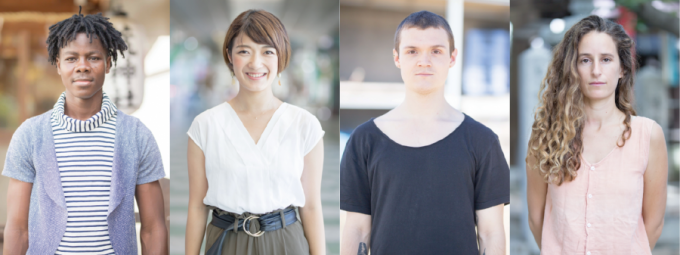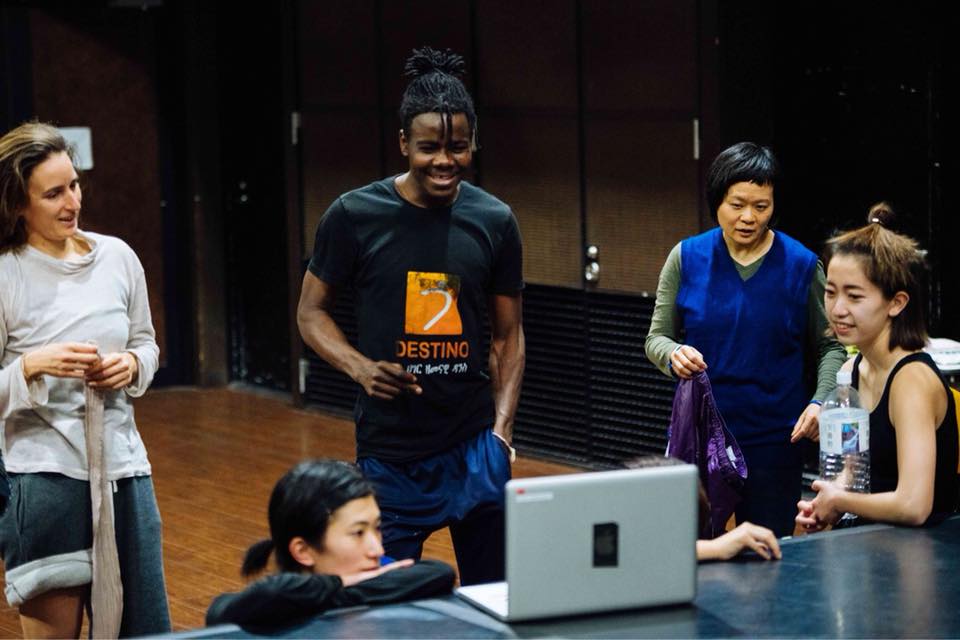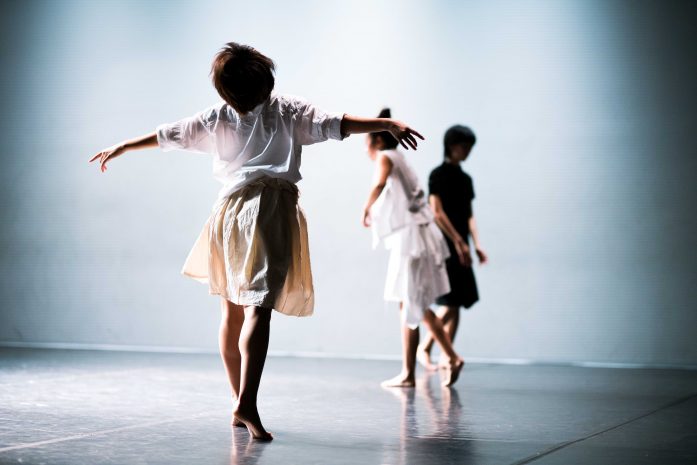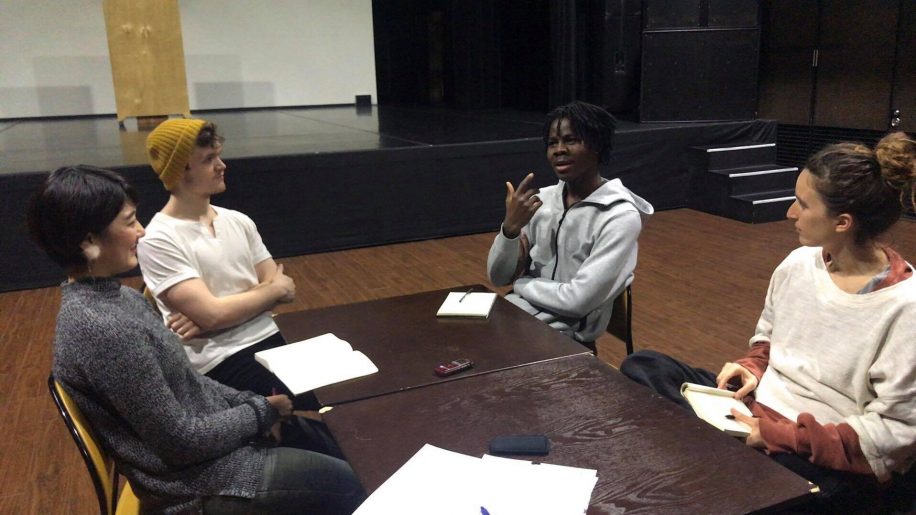2018.3.6
【国内ダンス留学@神戸6期】「成果上演」振付家インタビュー
INTERVIEW2018.3.6
【国内ダンス留学@神戸6期】「成果上演」振付家インタビュー
INTERVIEW
2017年末から2018年3月までの8ヶ月間、徹底してダンスに取り組んだ6期生9名。最終公演となる本公演「NEWCOMER/SHOWCASE #6 成果上演」では、プレゼンテーションにより6期生の中から振付家を選出し、それぞれ新作を発表します。
3月上旬、作品をつくっては壊し、様々なアプローチでクリエーションを進めている中、今回プレゼンテーションで選ばれた振付家4名、Alain Sinandja、宮脇有紀、Kyall Shanks、Maia Halterにインタビューとして、この8ヶ月のレジデンス、そして卒業後の未来を語ってもらいました。是非ご覧下さい!
・・・・・・・・・・・・・・・・・・・・・・・・・・・
What is your most impressive experience over these eight months?
この8ヶ月間で最も印象的だったことは何ですか?
Alain -
Yeah, I can say the most impressive thing for me, during this residence is the different choreographers Dance Box brought to give us their creations and workshops. All of the choreographers are so nice and they know their job. They were very open to the dancers and I found this very impressive.
そうですね、自分にとってはこの期間でいろんな振付家やアーティストとワークショップやクリエーションで関わることができたことです。どの振付家も私たちに対してとてもオープンに接してくださり、自分にとっては強く印象に残っています。
Kyall -
I think for me it was definitely Kota (Yamazaki). In Melbourne, we study the anatomy of the body as learn about dance, and I found not only Kota’s movement aesthetic beautiful, but he also had so much anatomical knowledge within that.
私はNEWCOMER SHOWCASE#1で関わった山崎広太さんが特に印象的です。学生の時にメルボルンでダンスに関する解剖学を学んできましたが、広太さんからは絶対的な美しい動きだけでなく、その動きにつながる多くの身体的な知識を教えてもらいました。
Yuki -
Kota San's work was very special. Until that we learned more techniques, kind of manuals of dance. Kota's work focused more on inside and also there is not much verbal information but we could feel so much from his movement, what was happening. At that time, I was working as an assistant to him which was interesting too. I did the interview with Alain and Kota, and after that we went drinking. We talked about lots of different things, not just about dancing, about social media, about what Kota's doing in New York, and so on. It made me think, dance has more possibility to approach communities, from this conversation.
広太さんとのクリエーションは私にとっても特別なものでした。大学も含めて、これまで様々なスタイル化されたダンステクニックは学ぶ機会は多かったですが、広太さんとのワークは身体の中に集中させていき学ぶことが多かった印象です。言葉で教えてもらったというよりも広太さんの身体から生まれるムーブメントから感覚を得たような気がします。同時に振付アシスタントとして関わらせてもらえたことも大きかったです。Alainとのインタビューを終えた後、みんなで飲みに行ったのですが、その時に話したことも凄く印象に残っています。New Yorkでのワークやダンスだけではないメディアやソーシャルコミュニティについてなどを教えていただき、ダンスにはもっと社会のコミュニティにアプローチする可能性があるなと、この会話を通して改めて考えることができました。
Maia -
Two things popped into my mind. First thing was Shintaro (Hirahara) San because I found the way he was working was so rich with creativity. He could take text and sound and music and anything here, and he made everything playful. The second thing that I felt was very strong was our first month in Dance Box when we had so many different. Meeting with (Masami) Yurabe San, was an incredible three days. I found it so inspiring that I already went to watch him twice in Kyoto. By his movement he understands nature. His dance is very sensitive. It was also sort of a new meeting with Butoh and for me it's a lot of what I imagined, before we came here.
私は、2つ思い浮かびますね。1つ目は、NEWCOMER SHOWCASE#4で関わった平原慎太郎さんとのワークです。言葉や音などここにあるものすべてを独創的な方法で作品を進めていったのがすごく印象的です。2つ目に特に自分の中で強く印象に残っているのが、8月の集中ワークショッププログラムでの由良部正美さんとの2日間です。
Yuki -
Back to the question, for me, it was the first time to work with other countries people in creations. Everyone has different backgrounds and experiences and ideas, all working on one show. Also, some Japanese people can't speak English well but still we can communicate without movement and...
質問に戻りますが、私にとってこんなに色んな国から、いろんな経験や考えを持った人たちと一緒にパフォーマンスに向けてワークしていくこと自体が印象的というか、8ヶ月の中で1番大きな経験です。全員が英語を話せる状況でない中、このプロセスを通してコミュニケーションしていくことが…
Kyall-
How it kind of transcends that language barrier?
言語の壁を越えたみたいな?
Yuki -
It's my first experience like this. It's possible.
そう! 自分にとってこのような経験は初めてで、可能なんだと実感しました。
Alain -
Mika Fujiwara (dancer ; graduate of the 2nd residency proguram) San and she told me "Alain, like, you became an adult, you become more adult", and I was really asking myself why she said it. For me it felt like nothing changed in me, but I feel like even if a learned a lot, I stayed the same Alain but it's really, really true, even if it cannot be seen, we learned a lot of things with different choreographers and a lot of experiences with different dancers. My mind, even if it is not clear now, I have some kind of idea of the type of choreographer that I want to become.
2期生の卒業生である藤原美加さんが「アラン、大人になったね」って教えてくれたのが、なぜ彼女がそう言ったのかよく分からないんです。自分にとっては特に変わったつもりもないし、色んなタイプの振付家やアーティスト、ダンサーからたくさんのことを学んでいたとしてもAlainという自分は自分でいるつもり。自分の考えとしては、今はまだ明確でなかったとしても、自分がどんな考えを持った振付家になりたいかという考えは生まれてきています。
Kyall -
It’s like, you don’t notice those little incremental changes as it happens. Little bit different, little bit different. You don’t notice from the inside.
Alainが言ったみたいに、 自分の中で少しずつ変化しているところは自分ではなかなか気づきにくい。ほんの少しずつ少しずつ変化していく。Alainも自分の中からだと気づかないんだと思うよ。
Maia -
Probably it’s something that, after the program finishes like the waves of perspective. It will come suddenly in three years; we can do a class and remember a moment from Dance Box.
たぶんそれは、このプログラムが終わった後、将来に返ってくるんじゃない?突然この3年以内くらいとかに、ダンスボックスで経験したクラスをやっていたりしてね。
Alain -
it’s not only about this program but all the people I met. I feel more, especially in Kotobuki House, more family than in my country. In my country I have my friends and my family, but they are at home and I am at the capitol city, so we’re not too connected but here it’s like we were born together and we grew up together. This very nice relationship between us and this is something very important and impressive for me.
このプログラムだけのことではなく、これまで自分が出会った人全部。私は特に今住んでいる寿荘では母国にいる時よりもみんな家族のように感じています。もちろん自分の国に家族も友達もいますが、国の中では都会の方にいることもあり、ここまでの繋がりはない。でもここではみんな一緒に生まれ育ったかのような感覚で、すごく良い関係性で自分にとってはとても重要で印象的。
Kyall -
I think that’s something that happens when you’re working quite intimately with people, every day.
それはかなり親密に毎日ワークしているから起こっているんだと思うよ。
Yuki -
True, true.
ほんとその通り!

When choreographing on dancers from different countries, do you notice differences between dancers from your own countries?
違う国のダンサーに振付をする時に、自分たちの母国との違いを感じますか?
Alain -
First is the backgrounds. We don’t have the same backgrounds so this is the first thing that’s different and the only thing that’s different between Japanese and African, Australian, the difference I feel is the technique everyone brings. It’s completely different. How we think about dance because when we talk, when I talk with friends, we don’t have the same perceptions of what is contemporary dance. This is something that’s different for me.
まずそれぞれのこれまでの経験。私たちは同じ経験をしてきているわけではないので、日本人、アフリカ人、オーストラリア人などの人種の違いよりもみんなが持っているテクニックの違いの方が感じるところは大きい。ダンスということを友達と話す時にも、みんな何がコンテンポラリーダンスなのか同じ認識を持っているわけではないから、それが自分にとっては違うところかな。
Kyall-
I find this a really hard question because I feel like regardless of country, within that country everyone’s backgrounds are so different and we have such different kinds of training and upbringing and different contexts that I find it hard to compare the people from different countries. Something I did notice though was in Australia I feel like, like I’ve said a couple of times, they push technique a lot whereas I feel like some of the people in this program hadn’t had as much of a technical training but there was such a beautiful kind of energy about the Japanese people and that’s what I want to absorb and get from them. This incredible kind of calmness and Haruka for example, there’s this very serene kind of beautiful energy about her, if that makes sense?
これはすごく難しい質問。私が感じるに、国とかは関係なく、みんな違う生い立ちで違う種類のトレーニングや経験をしてきていて、それぞれが全く違う人なので、それを違う国という視点から見つけるのは自分にとっては難しい。何かあげるとして、もう何回か言ったことがあるけど、オーストラリアにいた時に感じていたことで、ダンスのテクニックを沢山習得することに力を入れる一方で、このプログラムの何名かはこれまであまりダンストレーニングをしてきていないがとても美しい瞬間を目にすることが多い。それは日本人的なエネルギーから見えるもので私が彼らから吸収したいものです。それは絶対的な穏やかさ、例えば6期生の春香。彼女から出る美しいエネルギーとか、言いたいこと伝わってる?
Yuki -
Until now, when I was a university student, everyone could speak in Japanese. It’s easy to communicate however this in this situation it’s sometimes hard to make a piece. Everyone wants to understand everything. Sometimes it makes it hard for me to work on the piece. Because of you guys and yourbackgrounds, you have a wide focus…
大学生の時やこれまでは、みんな日本語が話せて完璧にコミュニケーションがとれるのが当たり前の中でやっていて、でも自分にとってはそれが難しかったりしていた。みんな一緒に創ったり踊ったりするからには全部を理解したいという状況。それは自分的には作品を創るという時には時々しんどかったりする。でも今の状況はすごく良い。みんな違う経験をしてきているからか視点が広くもてている。
Kyall -
Like dancers intuition?
ダンサーの感覚的な?
Yuki -
So, so. More Japanese people need answers, sometimes it’s hard, for me it’s hard to give them answers. So working with international people was a very good situation for me too. This is very different. When I was a University student everyone was like “What do you want to make, give me more information!”. Sometimes it makes it worse.
そうそう。日本人的なところでいうと答えがどうしても必要になってしまいがちで、彼らに答えを渡すっていうのは自分にとって難しいところで。だから今こうして多国籍な人たちとワークできていることはすごく良い環境。これまでとは全然違うところ。特に大学生の時は周りも含めて「あなたは何を作りたいんだ?もっと情報ちょうだいよ!!」ってなってしまっていたことが多くて、時々それが最悪な方向に走ることもあったりして。
Kyall -
Do you mean like it restricts in sometimes?
それって制限をかけてしまうっていう意味?
Yuki -
Mmm, yeah.
うん、そういうこと!
Maia -
I think body wise, because I come from the field of arts also, I, cultural aesthetics of movement. I try to look at it in a way, I sort of feel like there is the cultural of movement and the cultural of language and perception of language. I sort of look how it changes the way I move or we move, like, the people on the group and I feel more and more that the word “I”. The fact that it doesn’t really exist in the dialogue. Not saying “I think”, like in Japanese you don’t say all the time “Watashi, watashi, watashi”, likes we say in English or French or Hebrew. It changes the whole perception of the way you think and process with words and you, I think in general of course, it’s very much in the movement also. I feel that there is something that’s very considerate and the beautiful part of it is the attention on others. I feel it also in the movement, in the movement of state of mind, and the state of body, and of course it’s very personal, but I think in some way because we come from different backgrounds, maybe it’s easier to notice. Like, I don’t think there is distinct Australian body language or distinct African body language for each of us, or distinct Japanese. Yes, the way we think of movement and the way we think of life, it expresses within our movement and in this way I think it is very interesting, the difference of culture.
私が思うに身体の賢さという点で違うように感じますね。私もアートの出身であるからかもしれないですが、動きの文化的な美学や文化的な言語、そしてその言語の認識があるように感じます。私は言葉における「私」よりもグループにおける私や私たちがどう動くのかによって、それは変化しているようにも見えます。その事実は対話の中には存在していない。「私が思う」って言っているのではなくて、日本語みたいにいつも「私、私、私」を毎回言わない。でも英語やフランス語やヘブライ語では言うじゃない?言葉と相手をつないで考える認識の方法を変えるし、それには様々な推移があります。それは動きにも言えること。私が思うに、それは何か他の人に対する思いやりや美しさの一部になっていると感じます。それは動きの中にも言えることで、動きの状態や考え方、身体の状態なんかはもちろん個人的なものなのですが、でも私たちはみんな違う経験をしてきていて、だからこそ余計に気づきやすいのだと思う。日本人、オーストラリア人やアフリカ人の身体言語の紛れもない差異があるとも思わないし。そう、生活や動きの考え方は、文化の違いが私たちの動きの中で表現されていることを、私はとても興味深いと思う。

Why do you use dance to express yourself?
なぜ自分を表現する時にダンスを使うのか?
Yuki -
Very easy, because I’m not good at expressing through words. True! Even when creating it’s hard to explain in words, even n Japanese. Dance is very close to me. It’s like, this is me.
私は言葉で表現することが苦手なので、その方が簡単。あ、そう!クリエーションを進めている時も言葉で説明するのがとても難しい。日本語であったとしても。ダンスは自分自身に最も近いものだし、むしろそれが私だなと思う。
Alain -
For me, especially in Africa, I don’t talk too much. I’m a little quiet because I don’t like too much talk, especially when I’m hungry.*Everyone laughed.
私にとっては、特にアフリカではあまり言葉を通して話をしません。私は少し静かだし、あまり話すのが好きじゃない。お腹空いているときは特に(笑)
Kyall -
Hangry.
Alain -
Yeah. Dance for me, it’s the only… I tried sports, football, and volleyball. I tried some stuff but it’s only in dance that I can really express what I feel inside. I can show if I’m happy or not, it’s only in dance. If I want to hit someone, it’s only in dance that, all this rage, it’s only in dance that I can express it… When I dance I can really easily show my inside feeling. Japanese, if they are, they see something and are very amazed they say “Woah” but for me, it’s only by dance that I can really show this “Woah”.
そうだな、今までフットボールやバレーボール、いろんなスポーツに挑戦してきたけど、ダンスだけが自分の内側にある感覚を表現できる唯一のものだった。ダンスをするときは自分の内側をとても簡単に見せることができる。日本人は何かとてもすごいものを見た時に「まじで」って言いますが、私の場合はそれがダンスでしかそんなに見せることができない。
Kyall-
I think I’m the same, in primary school and high school I played Basketball and Tennis and Rugby and running and all these different sports. I did music, visual art, drama and everything. Trying everything and giving everything a go. I don’t feel like I so much as chose dance, as cheesy as this sounds, but I just gave it a go, a try and it felt like the only thing that was right so I just kept going, kept enjoying it. I felt like I didn’t want to do anything else after I started dancing, it just felt right.
私も同じように思うのですが、小学生から高校生までバスケットボール、テニス、ラグビー、ランニングなどいろいろ違うスポーツをしてきた。音楽やビジュアルアート、演技など全部。すべて試してみて全部やってみた。私はそんなにダンスを選んだっていう感覚はなくて、安っぽく聞こえてしまうけど、与えてもらって乗っかったって感じで、それが私にとって続けていきたいと思った唯一のものだっただけで、それを楽しみ続けている。ダンスを始めてから他のことをやりたいと感じなくなって、ダンスが合っているんだと感じているだけ。
Yuki -
I see. I agree.
そうね。めっちゃ共感。
Maia -
It’s more like something chooses you maybe, than you choosing it. The spirits tendency to find it’s natural expression. I am sure there are many ways we can express ourselves and many of them will be very beautiful but eventually it’s also what gives you joy. I know that when I enjoyed, like let’s say in Shintaro San’s creation, when we finished rehearsals I felt I could continue more. There is this feeling of belonging, that when you do the right thing it’s not so much effort. It can be hard but it doesn’t feel like it’s draining you out. There is something that is filling you in also. I think for me this is the good reflection that I am doing something I enjoy. Also, I must say that after many years of creating objects, I am enjoying creating something that doesn’t stay. Like, my body will not stay here forever and the time of stage will not stay here forever. The fact that it is like this is very beautiful.
それってなんかあなたが選んだっていうよりもあなたがダンスに選ばれた感じ。運命の神様が自然にその表現を見つけてくれた。私たち自身を表現する方法はたくさんあるし、それも美しいだろうけど、結局は自分たちが楽しめるものなんだと思う。私が楽しんだ時というと平原慎太郎さんとのクリエーションの時、リハーサルが終わった後も続けたかった。それは何か満たしてくれるものでもあって。私にとって何か私自身が楽しめることはとても良い影響になっている。あと私はずっと何かを作ってきていて、私は作るということ楽しんでいる、それが残らないものだったとしても。自分の体やステージでの時間がここには永遠に残らないし。実際、それがとても美しい。
Alain -
As Maia said, it’s like, kind of dance chooses us, and dance chose me.
マイアが言ったことに似ている。ダンスが私たちを選んでいる感じ、ダンスが私を選んでいる。
- Dance choose you.
ダンスがあなたを選んだ。
Alain -
In Africa we say, we are born with dance, so if we are born with dance why do other people not continue? Why did I continue? Why did I go to the university? Why didn’t I stop? Even with our careers as dancers, we don’t get money. Why push, push push, continue? Because it’s inside of us. I think it’s instinct.
アフリカでは私たちはダンスと一緒に生まれている。でもなぜ人々は続けていないのか?なぜ私は続けているのか?なぜ普通の大学に行ったのか?なぜそれを辞めたのか?ダンサーというキャリアはお金がもらえないのか?なぜでもプッシュし続けているのか?なぜなら自分たちの内側、それは本能だと思う。
Kyall -
I think from a young age, as a baby the first thing you do is move and you explore and grow. This is getting into a bit of a different topic but my belief is that the way the world has developed and the way society has developed is that it says to you “No, don’t move. Sit down. Be quiet. Be calm”. For some people they do this, they stop moving and they get quiet, and they only dance at parties. I think you can keep doing your art forms, whether it’s dance, or music or visual art. You can keep making noise or your can keep dancing or you can keep exploring, or you can become one of these quiet people. Yes, I think dance chooses, but I think it’s also an openness to keep playing, rather than dance just choosing us. It’s not letting other things stop us from playing .
私達は若い頃、赤ちゃんの時から動いて色んなものを探しては成長していて。世界や社会が発展して「動くな。座って。静かにしろ。落ち着いて。」と人々に言います。それに従い人達は、動かなくなって、静かになって、パーティーでしか踊らなくなる。いずれにしろ、私は自分自身のダンス、ビジュアルアート、音楽の形式を続けることはできると思う。音を作り続けて、踊り続けて、模索し続けて、あるいはそれらの静かな1人にもなることもできる。そう、私はその中で踊ることを選んだ。まあでも私はダンスが私たちを選んでくれたのであれば、むしろ色んなことにオープンに活動していきたい。それが私たちの活動を止めるわけではないしね。
Yuki -
Yeah, this is it. When I’m dancing, I’m very honest. In other situations, sometimes I think “This is not me”. Seriously, I’m quite serious.
うん、ほんまにその通り。私は踊っている時ってなんかとても正直で。別の状況になった時に時々「あれ?これって私だっけ?」ってなることがある。真面目に。
Kyall -
Like when you have to go work in the office compared to when you’re rolling around on the floor?
仕事しに会社に行っている時よりも、床に転がっている時の方が自分らしいみたいな?
Yuki -
So, so. Dancing is my personality. Like what you said though. Dance chose me.
踊ることは自分そのもの。私あなたが言ったように、ダンスが私を選んだ。
Alain -
Yeah, but I think it’s a very complex question because we don’t know tomorrow, we might find something more close to us, (*everyone laughing*) and we’ll follow that, “Dance”, ooooh, sayonara.
でも、この質問はとても複雑な質問だと思う。だって、明日のことなんて誰も分からないし、私たちはもっと自分に近いものを見つけるかもしれないし。(一同 笑)流れに身を任せます、ダンス、うーー、さよなら!
Maia -
Yes, but the fact that we choose to do something. It doesn’t mean we have to be total, to be only this. This can be a very wonderful way for expression for a certain time in our life and maybe in this time, that we express things through dance we still feed ourselves from poetry, from visual arts, music, calligraphy. The balances can change.
でも、私たちがなにかをする為に選んだのは真実だから。これだけをしないといけないという意味ではないし。自分達の生活のたしかなものを表現する時に、詩やビジュアル・アーツ、音楽、書のようなツールもありますが、ダンスは素晴らしい方法だと思う。
Alain -
Mmm, I hope dance for a long time hey, before it changes.
出来る限り長くダンスをやっていたいな。
Where do you see yourself in five years?
5年後、自分は何をしていたい?
Kyall -
Doing this. Yeah, that’s my answer, just doing this.
ずっとダンスをしているよ!これが私の答えです。
Alain -
Kota (*everyone laughs)
(山崎)広太 (一同、笑)
- Not so far hey? Five years.
5年はそんなに長くないよ。
Alain -
So yeah, not so far.
そうだね、遠くない未来。
Maia -
Sounds like a long time.
長く聞こえるけど。
Alain -
In five years I want to create a dance centre in Togo.
5年以内にトーゴにダンス・センターをつくりたい。

Everyone -
Oooooh. *Clapping*
Kyall -
I want to go!
行きたい!
Yuki -
Make a piece there.
そこで作品をつくりたい!
Alain -
Yeah, for sure. This is the most strong, in five years. Still, I want to really work everywhere with all of these members. Not just in Japan but really collaborate together, and work with Kota.
このプランが5年間で一番やりたいこと。それに、このメンバーで日本に限らず世界のいろんな所で一緒にコラボレートしたい。あと、山崎広太さんとも。
Yuki -
Five years. In five years, how old am I? 29. Almost 30, but dancing I hope hey? Creating. Wherever I want to go.
5年って私は何歳だろう。29、30才ぐらいかな。踊ったりつくったりしていたいな。いろんなところに行きたい。
Alain -
In the world.
世界中にね。
Kyall -
I have an answer but it’s not an answer. I don’t like to plan ahead because I feel like if you plan too much like “I want to be here”, it closes off other opportunities. The only thing I keep saying to myself is work hard, work hard and keep getting better, and I think it just keeps opportunities open to you, keeps them coming. The things just kind of fall into place I feel, if you work hard, be kind, be humble and then opportunities just kind of arise I think.
答えはあるけど、答えではない。将来の計画をたてて進めるよりも、「ここにいたい」ということから進めることのほうが好きかな。だって、他の可能性を閉ざしてしまうかもしれないから。私自身に常に言い聞かせているのが、よく働いて、少しずつ良くしていくことを続けること、そのことが次の機会へと繋がっていく。よく働き、優しくあり、謙虚であることで、機会が生まれてくると考えています。
Maia -
It goes fast, five years. It’s a really long time, but in five years it will go like that *clicks finger*. “Oh, it’s been five years”. Maybe in the dance, I hope to have the opportunity to find a place in Israel which is in nature and have a nice studio there that one can really dance outside most of the time, and only when it’s too hot or too cold to dance inside. To have a space where people come for creating and performing but very open.
5年は早く過ぎるだろうね。実際には長い時間だけど、「もう5年経った」という感じで進むでしょうね。ダンスでは、イスラエルで自然のなかに素敵なスタジオを見つけられたら。殆どの時間を自然の中で過ごすことができて、あまりにも暑いときや寒いときに室内で過ごせるようなところ。ここでつくったり上演したりできるようなオープンな場をつくりたいな。
Yuki –
Hmmm… No company employee for me. *everyone laughs*. No more company employee. I want to start something. I don’t know what however. Something to help connect the community with dance. Give them more ideas of how to connect with dance, more opportunities. Not just rules and restrictions. Japanese education is very straightforward, we have everything, and everything has an answer. Sometimes it’s hard to think about other opportunities or possibilities other than the way we’re told. I feel from contemporary dance and contemporary dance pieces and so on, I can feel that we can show them that there are more possibilities. So after five years, I don’t know. For now, I want to give Final Showcase to the audience, to try and give them a different focus, different thinking, feelings, atmospheres. So I’ll keep working hard.
もう会社員は充分かな。(一同 笑)何か始めたい。なにがどうとか未だ分からないけど。ダンスを通してコミュニティを繋げていくようなことを手助けできたら。ルールや制約とかではなくて。日本の教育は答え合わせを求めますが、あらゆることの中に答えがあることを見ていきたい。コンテンポラリーダンスやコンテンポラリーダンスの作品を通して、まださらに可能性があるのではないかと感じています。5年経ったら、今はまだよく分からないので、まずは成果上演。お客さんに異なった視点や考え方、感じ方、雰囲気を提示したい。とにかく頑張ります!
・・・・・・・・・・・・・・・・・・・・・・・・・・・・・・
国内ダンス留学@神戸6期 NEWCOMER/SHOWCASE#6「成果上演」
日時:2018年3月10日(土)15時〜 / 3月11日(日)16時〜
料金:前売 ¥ 1,500
当日 ¥ 1,700
学生・長田区民・donBuri会員 前売 ¥ 1,000
学生・長田区民・donBuri会員 当日 ¥ 1,200
※リピーター割引¥200引き(チケットの半券をご持参下さい)
その他詳細は特設サイトへ! https://danceryugaku.wixsite.com/main6
“8-MONTH RESIDENCY PROGRAM”TO LEARN DANCE & CHOREOGRAPHY 2017”
NEWCOMER/SHOWCASE#6 Final Performance
Dates: 10th and 11th of March 2018
Show Times: 10th: 3:00pm / 11th: 4:00pm
Location: ArtTheater dB Kobe,
Asutakunizuka 4-4F, 6-1-1 Kubocho, Nagata-ku, Kobe City 653-0041
Tickets: General Advance ¥ 1,500.
donBuri Club Members · Students · Nagata Prefecture Distribution Advance ¥ 1,000
※ Advance Fee ¥ 200 on the day
※ Repeater discount ¥ 200 (Off of original price. Please show previous ticket at reception desk)
Web: https://danceryugaku.wixsite.com/main6
[Contact/Reservation]
NPO DANCE BOX
Asutakunizuka 4-4F, 6-1-1 Kubocho, Nagata-ku, Kobe City 653-0041
TEL: 078 - 646 - 7044 FAX: 078 - 646 – 7045
E-mail: info@archives.db-dancebox.org Web: https://archives.db-dancebox.org/
Organized by The Agency for Cultural Affairs Government of Japan, NPO DANCE BOX
Production Coordinated by NPO DANCE BOX